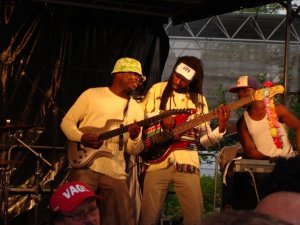
The disputed general elections that took Kenya to the precipice of destruction had an uncharacteristic impact on the country and her people. When this happened, Charles Kinga, a Kenyan scholar at the University of Copenhagen was contemplating his topic for his Masters thesis and the search process was unclear but when the unfortunate events unfolded, his subject matter crystallized.
He knew instantly that he wanted to do something on the Kenyan elections and when I met him, there was nothing to suggest that he was a musician and the founder of one of the most sought after reggae musicians from Copenhagen’s underground reggae scene. Like a serious scholar that he is, Kinga was focused on his research and was looking for Kenyans to interview in his study aptly dubbed Taming Modernity- Understanding Emerging Trends in Political Electioneering in Kenya.
The musical connection came when I inquired about his work as a lecturer at the same University yet he spots long dreadlocks that would remind you of Maxi Priest. The revelation was not only insightful but also an exciting tale of the rise of a humble goat herder from Ukambani, who grew up in Nairobi’s tough Eastlands neighbourhood and has not only distinguished himself as scholar, linguist, lyrist and musician, but also as an entrepreneur of good judgment. He has also recorded and released a number songs that have been modeled around his unique way of going about music.
“I have not done albums in your usual way of releasing albums,” Kinga told Kymsnet Features. “I feel the market is flooded with half cooked music … maybe not bad in content or quality but overly abundant. I am yet to release an LP or album. However, I have recorded a couple of EPs, which were for demonstration purposes only and are therefore not published/released. The first was a self-titled 3 song demo completed in 2002 – we called it Simba Ngoma like the band was then. Most of the music that I have recorded has been in Asia and in Europe.”
This was also the year that the band changed its name to Kinga and The Reggaelution, an 8 piece reggae band based in Copenhagen that plays fresh and melodic music based firmly on the classic drum and bass synthesis of roots rock reggae.
“The full-band sound is a trademark of great solidarity as every time they perform,” he pointed out. “This band cuts right through different reggae tastes and styles and they score highly on their raw energy and persuasive style. Armed with dynamic modern roots reggae crafted around thought-provoking messages, The Reggaelution is now recognized as one of the most exciting “live reggae acts” in Denmark.”
Their uniqueness is not just limited to the way they play their music. The lyrics of the songs that they perform are deep in the old reggae fashion, an inspiration from Kinga’s all time reggae icon, Bob Marley.
“Bob tends to lead the pack of my musical giants,” Kinga noted. “I find him most complete—his music, arrangement, sound, vibe, temperament and words. Then I have other favourite singers and writers like Alpha Blondy, Prince Lincoln, David Hinds (Steel Pulse), Burning Spear. These too have depth in their music including well executed arrangements.”
He added: “I like Linton Kwesi Johnson…… academic dub is good. I mean he has managed to transform his educational precision in writing poems which become dub, but has used patois as a vehicle to explain his poems – with a formidable band. Excellent– his dub poetry is a solid listen for his thought provoking lyrics and use of patois on an academic level. He is a top favourite of all time.”
Sharing and fusing an academic angle to the genre is one of the quality that Kinga might share with Kwesi Johnson but Kinga has not forgotten his humble beginnings that he still sees as having informed his musical outlook.
“I have had a full life with a lot of memories that actually carry me through even today,” Kinga narrated to Kymsnet Features. “Growing up as a herds-boy and spending long hours on the savannah has definitely shaped my adult life. Again, the community life of the tenant yards of Jericho Lumumba estate, Eastlands brings back pleasant recollections of our (Kenya’s) rich cultural heritage and urban language culture. Playing all sorts of made up games on the parking lot, watching the bigger boys play football (Uwanjo soo), Tazama mobile outdoor flicks (walk-in) and plenty more … One has to write a book if one has to put it all on paper.”
He added: “There is no singular place I can say that I draw inspiration from. My lyrics are driven by life observations, experiences, peoples’ stories– dreams, nightmares, aspirations, wise sayings or parables, current affairs/common sense etc…Inspiration comes either impromptu or is cultivated over the years. But my lyrics are almost always thought provoking social commentaries.
The most lost lasting inspiration is from day to day life and the memories it brings. If such memories stick to the mind, the inspiration is complete. It might take years to come to fruition in form of melody and song or lyrics OR five minutes. But if it stands out, it becomes music.
Born at the famous Pumwani Maternity hospital, Eastlands, Nairobi in the early 1970s, Kinga, the 4th in a family of seven (three brothers and three sisters), went to school Martin Luther (in Nairobi) and Mulumini (in Ukambani) Primary Schools. He then advanced to Miu Boys High and Mission Bontá (Kiongwani) Academy for his secondary school and then proceeded to India for his University education in 1990s. While in India, he did his Bachelors degree and did a couple of years of LL.B. He also ventured into business as a proprietor of a reggae club called Simba Ngoma before moving to his current base in Denmark, where he has taken his three points of interest— academics, music and entrepreneurship, to the next level and is looking forward to crowning it all with a doctorate.
Did he want to be a musician?
“I wanted to be many things,” Kinga, a father of a four years old daughter pointed out. “I was always good with books (education) and romanced with the idea of being a lawyer in my teenage and early adult life. My father chided me by calling me Professor when I was young I remember. I believe that will come to pass someday soon.”
However, it is different for his music that he reckons that the bug simply chose him.
He said: “I did not. It chose me, but I made the effort to make it worth the while for everyone else. Music was a hobby that gained momentum over time … I had the talent and utilized it. I sang in the choir in primary school, many times the soloist … led in singing the national anthem at secondary/high school etc. I had a strong voice.”

The interest was also propped up and influenced by so many different sources with what he describes as the local unsung heroes with some less known names like Moses Kamau (aka Kam Kong), Basoli, Irap Mac De PETER and Masasu Explosion, who lit the fire and put the eagerness to play music in him.
Among the established artists Kinga noted that he was also influenced by the music of groups and individuals like Simba wa Nyika, Fundi Konde, Kakai Kilonzo, Katanga Boys band, Joseph Kamaru, Daudi Kabaka, Ochieng Kabaselleh, Mbaraka Mwenshehe Mwaruka, Remi Ongaro (Sura Mabaya) Franco (Lwambo Makiadi), Tabu Ley and any other group whose music reached Kenyan radio from Zaîre etcetera. All these people have had their impact alongside his favourite international start that range from Bob Marley, Alpha Blondy, Burning Spear to funk and soul.
“Funk and soul has had its part to play too, though it seems to lack substance at times,” Kinga pointed to Kymsnet Features. “I was taken up by MJ and the wave that followed his work just like most youth then. All these songs they played on Radio; programmes like Unapofanya Kazi, Sundowner, Reggae Vibrations by Jeff Mwangemi. I do like rock as well, from hard to soft; Pink Floyd and Dire Straits top the list, Jimi Hendrix, Jim Morrison, STING and the Police, Metallica, Led Zeppelin, Van Halen, Bon Jovi and so forth. I actually played bass guitar and sang in a couple of rock bands in India.”
A number of the stars that influenced him musically have remained distant but he has had a chance of curtain raising for artists like Freddie McGregor, the late Lucky Dube, the Nazarenes and played in festivals that headlined big names.
“The McGregor show was an experience since the band allowed us to play on their back-gear, Kinga recalled. “We were pretty new in the business, the hall was large and well packed, with the best acoustics you could imagine. Apparently, they were showing appreciation because I had lent their guitarist my guitar amplifier. That was in 2004.”
He added: “In the same year I was asked to open for Lucky Dube in the same venue. Their sound check made us feel small I remember. After the show, we had a good chat back-stage with the band. Lucky and I spoke for a shortwhile during a break where he autographed my No Easy Walk to Freedom. I wanted that for my younger brother. Lucky was a very humble down to earth man, almost shy with that coolness of a big brother. God rest his soul.”
It did not end there because later that year, Kinga and The Reggaelution appeared in Upsalla (Sweden) for Scandinavias biggest Reggae festival. There Kinga met Alpha Blondy, his teenage reggae hero and spend much time with him after his mind blowing performance. They spoke of all sorts of things (in a mix of English and French) with no holds barred.
“Then he pulled a first one on me and asked for me to autograph a demo CD I was presenting him… you can imagine how that felt,” he recalled. “I hope to see him again this month when he performs in Copenhagen.”
A strong believer in roots reggae, Kinga is of the opinion that roots reggae is a little like Levi Jeans that goes out of trend but never out of fashion. He predicts that the cycle of dancehall is about to reach full circle and people (artists and fans) will return to the cool and come of roots.
While talking to Kymsnet Features, Kinga didn’t just air his opinion on the continuity of his favourite musical genre, he also tackled the often held misnomer that marijuana is the “holy herb.”
“Marijuana is a drug,” Kinga asserted and also advised the young musicians and fans alike in Kenya and even around the world. “One should keep off it. I know the temptation is very high (for teenagers especially) to experiment or to cope with peer pressure. Fair enough! At the same time I feel that we have (the authorities in Kenya) have demonized the herb and stigmatized it’s (ab)use so very much that apart from further attracting the youth’s interest it has become a sign of anti-establishment individual rebellion. Ganja is not necessarily holy; but I know that in Indian religions it is seasonally used to induce spirituality… now to us as Kenyans, those religions are foreign. In addition, the strain that grows on the sub continent or elsewhere (say Jamaica), is not the same potent strain that grows in Africa. Seriously, this perception that it is a sacrament is far-fetched, though I’m not disputing anyone’s religious dogma – remember Rastafari is not officially a religion. So if one is to attempt smoking cannabis sativa or taking any other form of drugs, one should know what they are partaking in fully. Just as coffee can be excessive so can this so called holy herb.”

Pingback: Gæstelærer: Charles Kinga, Kenya |